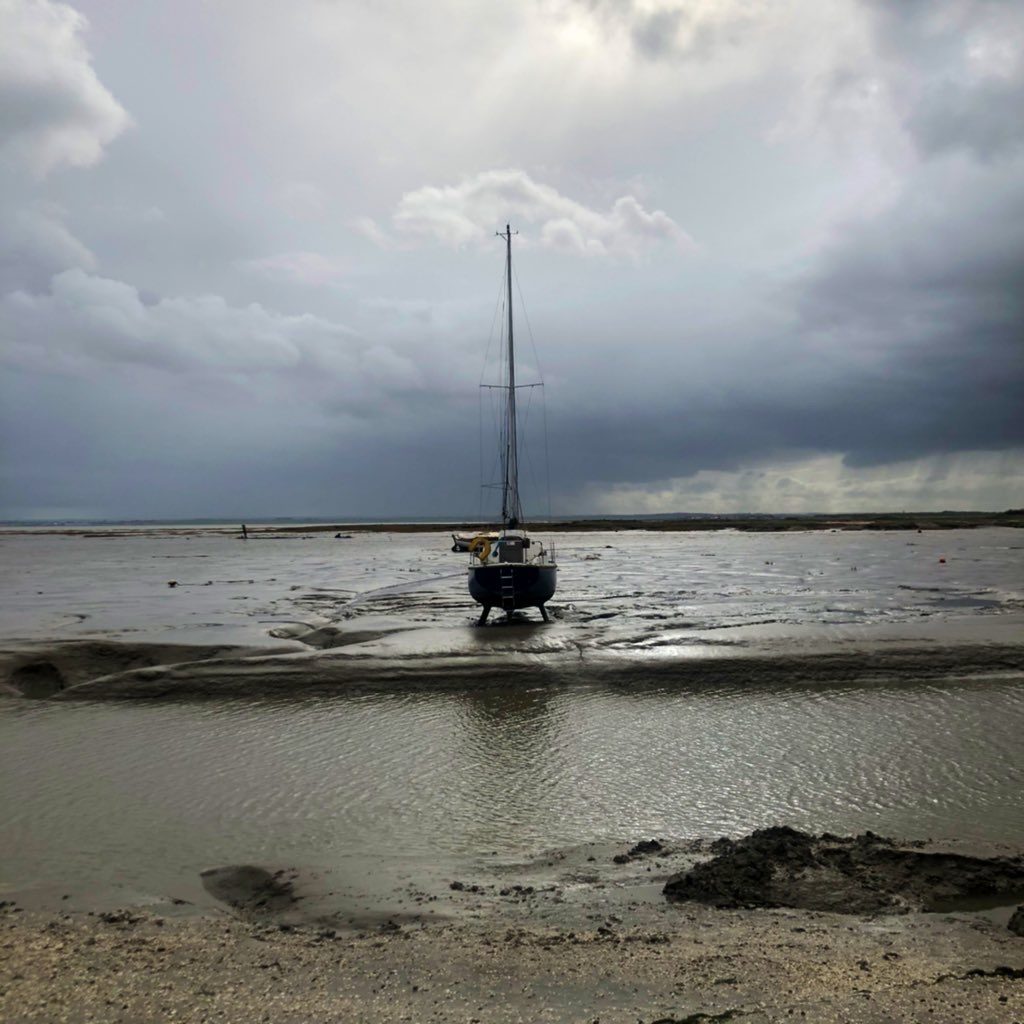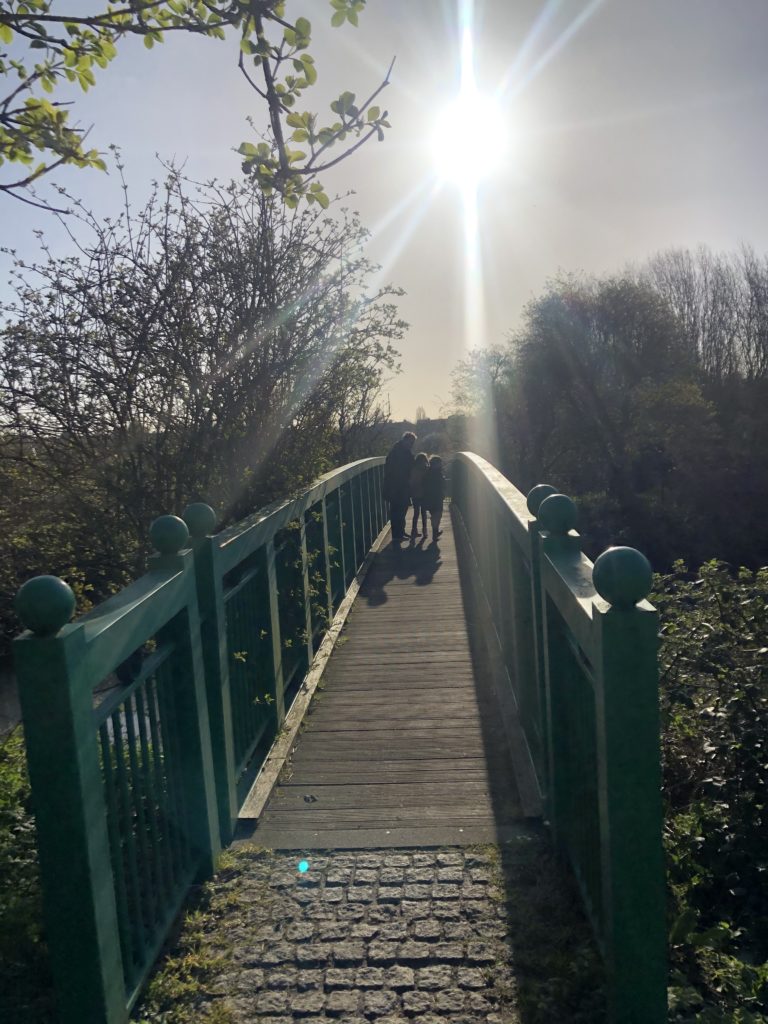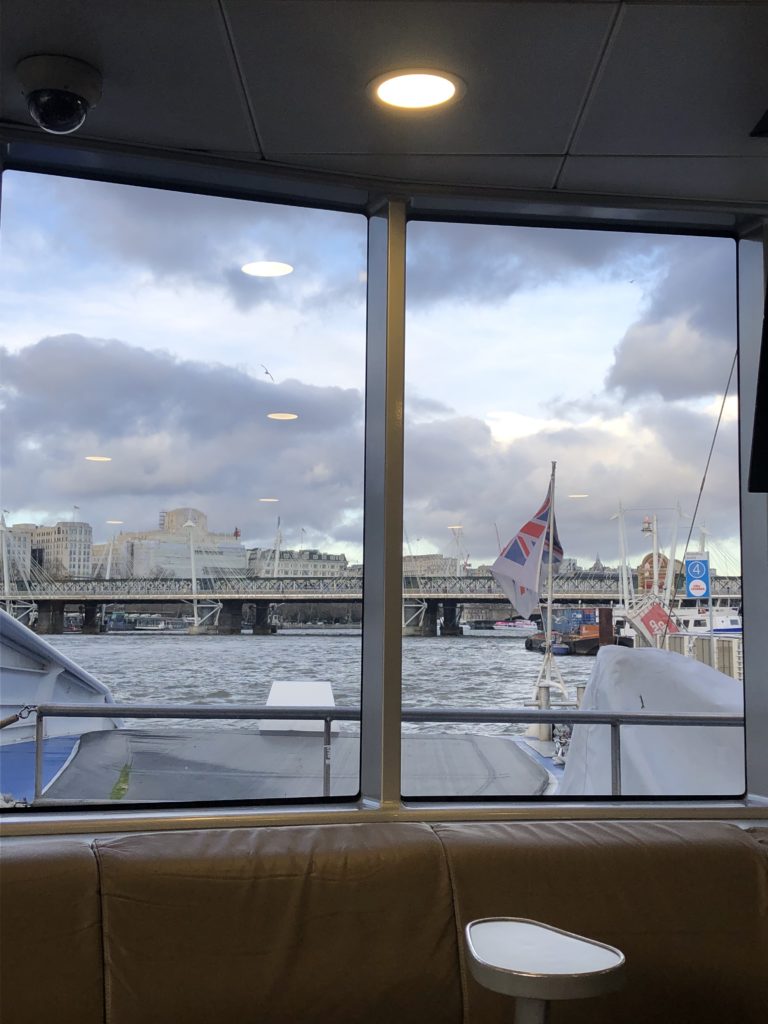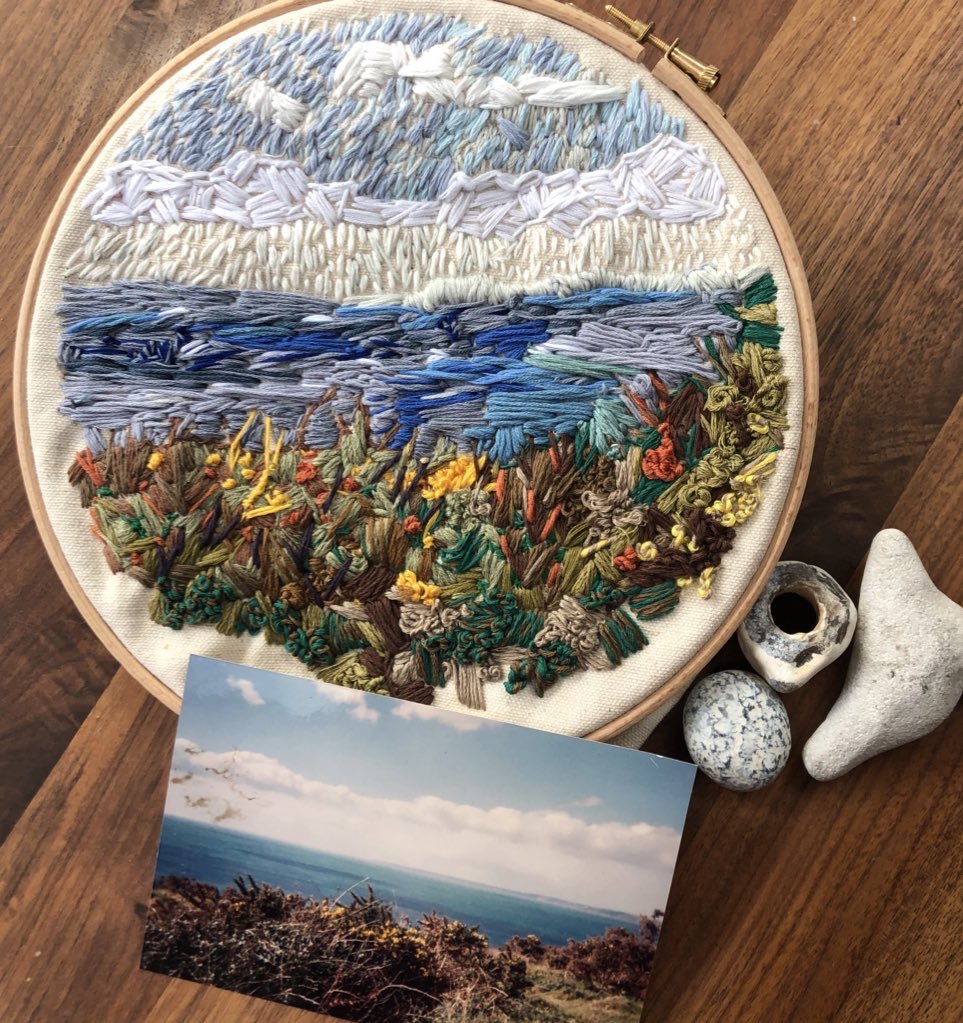A year on from ‘Hopeful Arrival‘, Kirsteen McNish writes in memory of her sister on change, fear, isolation, and her love of the sea.

I’m stood in the garden in wellies and lipstick, going nowhere – in some hinterland between normality and the otherness we are all feeling in this strange new world which envelops us like a sudden fog. I’m listening to the distant rush of the north circular, the purr of a neighbour’s lawnmower, the sycamores stretching, and a bird call I can’t identify. It’s a persistent sound somewhere between a crack crack and a mew, coming, I think, from a rooftop, and I am straining to catch a glimpse of the bird it belongs to. I have seen robins, Collared Doves, Blue Tits, wrens and sparrows all before 9am, as well as the morning parliament of crows that gathers in the willow tree outside, taunting the cat and just waiting, waiting for something. The new call mingles with the still-surprising sound of a neighbour’s cockerel down the end of the Warner terrace, and it sounds raw. I stand on my tiptoes, trying to see, and feel the thud of my heart as it cartwheels and flutters in my chest. The more I overthink, the more I imagine pains that my head knows I don’t really have. I came out here to busy myself by creating impromptu obstacle courses for my 8-year-old son out of bits of wood, plant pots, tennis balls and a bamboo stick – wracking my brain to think of activities that won’t be met with his eye rolling and smirks. I think of my Dad, telling us the names of birds as a kid as I kicked up dust in my Clark’s sandals beside the River Welland – desperate to scuff the toes, resentful of the fashionable sandals of my classmates – and he patiently persisting with his knowledge of the natural world, despite his shuffling audience of three.
Dad would take us on long walks through Kingswood Woods near the housing estate we lived on in Corby, and for a moment I’m there again in the dappled green of the woods, him pointing out tadpoles in ponds, pellets dropped by owls and trying to distract our attention from the random glue bags and 20/20 bottles, discarded like odd fruit under ferns by late-night teenage gatherings. He’d speak with the gravitas of a lawyer preparing counsel as he estimated the age of the trees amongst the bluebells. In later life I realise he equipped us all with a sense of recognising beauty in unexpected places – the flowers in the pavement cracks, young saplings sprouting from tumbledown walls, gold in dirt that was all ours for the taking. “What do you think that bird is?” I ask my son who has just joined me in the garden. He replies “velociraptor” and slopes off, snickering, to the trampoline. I feel brittle and crestfallen for a moment and then realise my daughter has systematically thrown all the books off the living room shelves with the energy of a small cyclone and is crouched, stranded on an archipelago of self-made chaos, bottom lip quivering and needing rescuing onto safer shores. I glance at the clock and realise I have 11 hours yet to fill. I reassure myself too of all the books I have to read, the emails I now don’t have to send and the hours in a garden to plant. Then it comes, the chest crusher, the feeling I know too well.
I have barely left the house for three weeks now. My nearly 11-year-old immunocompromised daughter with special needs has been hauled out her out of school to protect her against this new virus and then my son followed, gasping like a fish out of water and angry as a newborn. The boundaries I have crossed since then are ones of permission, driven by a panicked, searing love. There are shifts too – barely perceptible and unimportant in the scheme of things but my eyes have suddenly seemingly developed more colour cones. I am noticing things in much sharper focus; the clear skies now seem psychedelic azure, and the celandines in the lawn are clusters of suns. The too-early flowers seem more brazen in strip light neons.
My partner has reluctantly made his mission control out of the bedroom and the desktop blinks in the night like an illuminati eye, whilst my son’s room has become a raft of Netflix, colouring pens and crumbs. My daughter’s is as small as her world and larger than her voice. Without permission the routine she clings to has been jangled out of all recognition and she is newly Alice in Wonderland, with strange new rabbit holes to navigate.
We creep out in the wee small hours the next day to Tottenham Marshes. The boats undulate softly in the canal with their cracked paint, pot plants and names like Stolen Moments and Viking King. My partner pauses on the bridge, half-holding, half-restraining my daughters’ hands so she can’t touch the barriers, my son streaking off ahead, elastic-limbed, shouting “I’m first!”, ever-competitive, freshly resentful.

I scan the skies, hoping for a bird of prey, but instead I see vapour trails. I close my eyes and fancy the swoosh of the grasses, the sound of the sea. I look up and see a water tower juxtaposed by a red danger sign, previously innocuous but now somehow beautiful and profound in its symmetry.
A day or two later in the white heat of trying to impose new rules I beg to be driven to Epping Forest before breakfast. As we approach the slip road, I suddenly feel a sensation like I am falling, and my shoulders go numb. I check my phone to see if anyone has texted – but it’s as blank as milk. Stuffing it back into my pocket we stumble through the trees, recently cut back and stark in the stubble. The bite of cold starts to ease off and I hang back I see a flash of green followed by a thrumming – a woodpecker, which seems to set off a telephone wire symphony of back and forth. I take out my phone and begin to record it for my friend’s radio show, and whilst doing so wonder how many people found themselves in this exact place, pausing and feeling like lonely first-footers in the interior of what writer David Southwell would call “London’s Wild Shadow”. I listen to the recording later, alone in the bathroom, and realise it’s picked up my breathing, shallow and audible. It’s too late to unsend. As I get back in the car and Twitter cranks up its alarm signals, Chingford Plains whizz past in the drizzle. I watch a rain drop suspended on the window, clinging on, and I realise I don’t want to be in this stasis. I vow to get busy with activity and the blossom on the cherry tree at the junction seems to nod in agreement.
*
Last summer I travelled with my family to Scotland, stopping off at a friend’s studio in Nottingham. Warmly bathed in its welcoming light, I felt feverish, like one does in the first flashes of lust. I chatted to my friend and his partner, like a late-night raver on amphetamines, about the forthcoming visit to a lighthouse. They smiled broadly and patiently waited for me to take a breath. As the sun cooled, my son drawing castles and my daughter nestled on their couch, I felt a bone cracked open in my chest by their kindness. A day later in a Scottish town, rinsed out from travel and lack of sleep, I paced the sleepy harbour, met with the side glances of a middle-aged man setting up his stall – on the back of a piece of cardboard it said “art lessons twice a day – £10”. The previous day’s howling winds and flooded fields have been replaced with the calm of a mirror as far as the eyes can see. The light is something else. He asks if I’m okay, and I blurt out that after months of planning and excitement a boat is coming to collect me and I can’t get on it. I can’t feel my legs. He smiles and says kindly and slowly “That’s okay, I was in the Navy and am still fearful of the sea”. My friend glides into the harbour and I sob, rasping into her collar that I can’t do it, and she soothes me whilst her young kids and partner look on in their life jackets, bemused. I watch ten minutes later as my son and partner drift away into the morning sun, waving, and I am furious with myself, deep in self-hatred. I think of my late sister and I dig my hands in my pockets I make a promise to myself and her.
*
6 months later, late January and I’m spending my birthday in in the National Portrait Gallery. I’m met by a dear friend of few and wise words. He gives me just-budding Hyacinth bulbs and they scent the air as we pace around those long-dead as they peer from the walls. I have 2 hours before I need to be back home. As I say my goodbyes, I tell him I’m going to go to the Southbank, and he raises an eyebrow and says “Are you sure? Do you want me to come?” I wave hurriedly and rush off to the tube. As I approach the platform the ticket seller tells me I have one minute to board the Thames Clipper. I’ve not been on a boat since 9 years ago in Richmond, for a literature event I organised with Caught by the River. My phone pips with a message from a man that always knows intuitively when I’m on a precipice. “Can I call?” “Give me ten minutes” I type, as the rope clinks and the door clunks behind me like fridge freezer. It’s too late now. The boat shimmies sideways and lurches into action and tourists snack, chat and nonchalantly enjoy themselves. My legs are trembling with the force of a small festival tent generator and my top half is frozen like an Aunt Sally. A small girl looks at me quizzically and I stare at the bow as a beaten union jack flaps furiously in the wind – and I smile, exhilarated, as the boat approaches Southwark Bridge and I scramble off two stops later. “Hullo? Where are you? What? You are fucking kidding me?” Adrenaline courses through my veins and a few odd looks are thrown my way. I shake as I splutter out the words and my hair sticks to my face, but I feel like I am flying. A tiny step to most but a mountain has been climbed.

Two months on, the day before we all get stuck inside, I stand with my daughter at Leigh- On-Sea, watching as darkened clouds beat a sudden path towards us. My son races for the car, yelling, and my daughter pulls me back. She is pulling me towards the eye of the storm and we get soaked together, laughing, as she dances to a rhythm I can’t hear. The masts are tinkling in response to the haar and I think of the stretch lying ahead of us all and the gossamer threads of communication between friends and family becoming more important as we pull together. Sitting here each evening stitching my first attempt at embroidery from a photo of a clifftop near Rua Reidh lighthouse in Wester Ross, I realise I don’t know when I might get up there again. I pause under the lamplight, think of everyone bravely coping with their respective new realities, as they kick in, with such courage, and I try to breathe differently.

*
In memory of Rachael McNish